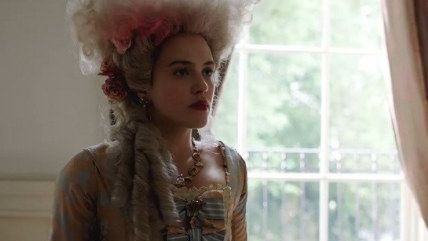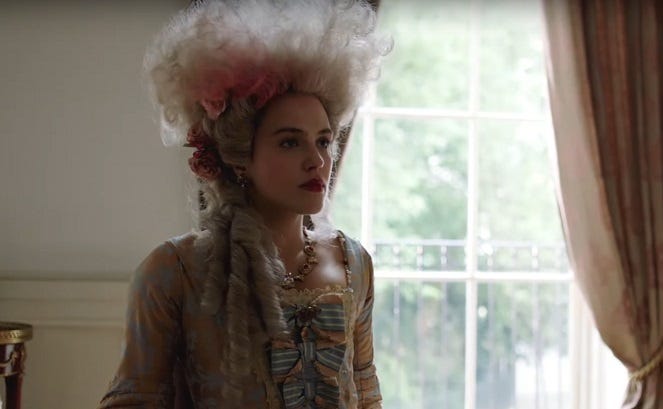Harlots Doesn't Sell Out When Detailing Lives of 18th Century British Hookers
New historical sex drama comes to Hulu.


Harlots. Hulu. Available March 29.
Somewhere in the vast terrain between the hooker-as-fairytale-princess fantasy of Julia Roberts in Pretty Woman and the prim, grim Victorian sociology of Stephen Crane's Maggie: A Woman of the Streets lies Harlots, Hulu's odd but engrossing new drama about life inside an 18th-century London brothel.
Screenwriter Moira Buffini, one of the five British women who produce, write, and direct Harlots, said in unveiling the project that the goal was "everything from the whore's-eye view." The result is that the women in Harlots are neither glamorous courtesans nor broken flowers, and their depiction is never erotic. There's plenty of nudity, of both sexes, but you've seen commercials for bladder medication that were sexier.
The Harlots hookers don't make much money, but it's a living—and they regard the cops and and do-gooder moralists trying to close their house less as saviors than as a circling wolfpack. When a judge who's been asked to close the bordello as a public nuisance haughtily declares that "I grieve for the desperate women I have seen today who, faced with starvation, have sold their flesh," the prostitutes in the courtroom exchange looks laden with the unspoken question: "So you think we'll be better off in jail?"
Harlots opens in 1763 with a prologue that claims a fifth of the women in London were hookers. That runs far ahead of police estimates of the day, but there's little doubt prostitution was a major industry. One of the show's early scenes, in which the women amuse themselves by reading their own notices in a Consumer Reports-style guide to the various local hookers and their skill sets ("one of the finest, fattest figures as fully finished for fun and frolick as fertile fancy ever formed…") is drawn from documented history.
The brothel at the heart of Harlots is operated by Margaret Wells (Samantha Morton, nominated for an Oscar in 2002 as the troubled young immigrant mother of In America), a veteran of the trade whose virginity was bartered away for a pair of shoes at age 10 by her own mother.
Margaret, buffeted by high rent and increasing graft demands by cops, hopes to get a much higher price for the maidenhead of her teenaged daughter Lucy (British TV actress Eloise Smyth). And she's playing the even more lucrative long game with slightly older but much more reluctant daughter Charlotte, who she's trying to place as an indentured consort to a wealthy nobleman.
But her plans must be dangerously accelerated when cops raid her house, putting her out of business at least temporarily, and a rival madame (Lesley Manville of the British version of Law & Order) starts raiding her corps of whores. It turns out these two events are not coincidental. In a classic example of the regulatory-economics parable known as Baptists and Bootleggers, the other madame has been funding a decency group to attack Margaret's brothel and clear away the competition.
That plot description sounds bleak, which is not entirely fair. Harlots burbles with the bawdy workplace humor of the hookers, from their theories about the sexual ontology of the reformers (the blind leader of the decency group, they speculate, lost her eyesight after putting her eyes out upon seeing her first penis on her wedding night) to, tart—heh-heh—remarks about job training. Told she must undergo instruction in cultural refinements, one of the women inquires, wide-eyed: "So, you will teach my cunny French?"
The humor extends to the casting of Charlotte, the steely daughter resisting indenturement. She's played (quite well) by Jessica Brown Findlay, that sweet and gentle Lady Sibyl of Downton Abbey, whose death in childbirth so unhinged PBS cultists that the Washington Post ran a medical story explaining preeclampsia, the obscure condition that killed her, demanding an explanation of her inadequate treatment: "If Lord Grantham had listened to the country doc and sent his daughter to the hospital for a Caesarean section, would she have lived?" I'll buy a drink for the first one to write the Post asking if the preeclampsia could have been caused by repeated cases of 18th-century syphilis.
Still, there is an underlying bitterness to Harlots, less toward the prostitution itself than its root cause, a coarsened society in which the options are so limited for women that becoming chattel actually represents an achievement. "Thank you, Mum, for all you've done for me and Lucy," says Charlotte in a dead voice upon hearing the story about being swapped for a pair of shoes. "You never, ever sold us short." Murmurs her mother in heartbroken reply: "I prayed for boys."
Editor's Note: As of February 29, 2024, commenting privileges on reason.com posts are limited to Reason Plus subscribers. Past commenters are grandfathered in for a temporary period. Subscribe here to preserve your ability to comment. Your Reason Plus subscription also gives you an ad-free version of reason.com, along with full access to the digital edition and archives of Reason magazine. We request that comments be civil and on-topic. We do not moderate or assume any responsibility for comments, which are owned by the readers who post them. Comments do not represent the views of reason.com or Reason Foundation. We reserve the right to delete any comment and ban commenters for any reason at any time. Comments may only be edited within 5 minutes of posting. Report abuses.
Please to post comments


"""their depiction is never erotic"""
So no reason to watch?
Maybe 18th Century brothels were all business and little pleasure, unlike today.
Harlots opens in 1763 with a prologue that claims a fifth of the women in London were hookers.
Ye olde English hookers? No thanks.
British prostitutes? We couldn't set this story somewhere else? Anywhere else?
Olongapo?
And she's playing the even more lucrative long game with slightly older but much more reluctant daughter Charlotte,
Iron Maiden called it.
https://www.youtube.com/watch?v=OBR-A_YfxJ8
If you want a bodice ripper you'll have to watch Outlander.
On the plus side, they do seem to be wearing some awesome period gowns. Maybe it's only not-erotic to men.
The boys born to prostitutes often ended cleaning chimneys and dying of testicular cancer. They will probably not mention that, doesn't fit into the women as victims narrative.
The comment about "police estimates of the day" is necessarily mistaken. The British had no paid professional police in the 1700s. Neither paid professional police nor paid professional prosecutors existed in the UK till the 1800s.
http://www.daviddfriedman.com/.....18thc.html
That could also be a mistake in the show. A house of prostitution might have been prosecuted by neighbors as a public nuisance, but not by police or a public prosecutor. Law enforcement in the UK in that era was do it yourself and volintary.
my buddy's mother gets 66 each hour on the internet, she has been out of a job for twelve months.. the previous month her payment was 16114 just working on the internet four hours per day. go here to this
+_+_+_+_+_+_+_+_+ http://www.moneytime10.com
I wonder if they include the numerous and very prevalent tween prostitutes that caused such a stir in the 19th century that age of consent laws were risen/came into play. Though those laws came into play not to protect youth but to preserve female "purity" in general.
Excellent website, excellent post as well!
I genuinely love how it is simple on my eyes and the data
are well written.I'm wondering how I could be notified if a new post has been made.
I've subscribed to your RSS which should do the trick!
http://forums.banatmasr.net/
http://forums.banatmasr.net/f24/
You need to look here https://writemyessay4me.org/blog/research-tools for some info on research tools. I think that it could be really helpful for your future assignments